Welcome to our new Faculty Features series! Every Friday for the next eight weeks we’ll be sharing a short interview with some of our faculty members; highlighting their teaching, upcoming courses, and getting to know them better! Today we’re featuring Professors Stephen Anderson, Laura Byrne, Nicholas DiEugenio, Aaron Harcus, and Donald Oehler.
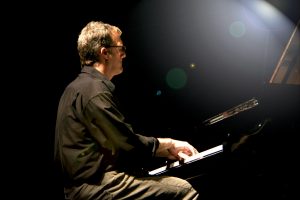 Professor Stephen Anderson
Professor Stephen Anderson
- What is your position on faculty and what courses are you teaching next semester (and this summer, if applicable)? Professor, Composition and Jazz Studies, Director of Jazz Studies. I direct the UNC Summer Jazz Workshop, which will take place M-F June 21-25, 2021. Each fall I teach MUSC 145 Introduction to Jazz (history), MUSC 135 Jazz Theory, MUSC 200 Jazz Piano Lessons, and MUSC 214 Jazz Combos.
- What is your favorite part of teaching? I love working with bright students who are as excited about music as I am. Helping students to accomplish their goals inspires me to want to continually improve my craft as a composer and pianist.
- What is the project that you’re most excited about currently? Since the pandemic began, I’ve been sending audio files back and forth with my friends and colleagues in the Dominican Republic, Puerto Rico, and Cuba. We’re working on the second Dominican Jazz Project CD that is scheduled to be released on Summit Records in June 2021. The daily communication with these friends and musical collaboration has helped me to stay optimistic despite the challenges we all have faced during the pandemic.
- What are some of your non-musical hobbies? Outside of music, I enjoy spending time with my family, and as a family, we have found regularly serving people in need to be a source of joy and satisfaction in life.
-
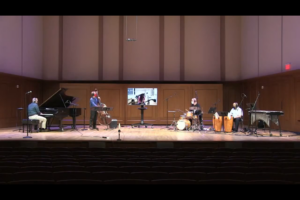
Stephen Anderson (far left) performing with other jazz faculty members in October 2020. If your students could learn one thing from you, what do you hope it will be? To enjoy the process of diligently working to develop their talents by using effective compositional and performance techniques.
- What music are you currently listening to? I binge-listen. Before I begin composing the music for a commission or for an album project, I saturate myself in the music of the type of ensemble or project that I’m writing for. Then once I begin composing, I tend to not listen to much music until the piece is finished, as the ideas for the piece tend to always be playing in my mind throughout the day. I do not listen to music as “background music” very often since intensive listening is usually part of my practice or compositional routine related to the projects that I am working on where I am transcribing figures that I feel I can use as a performer or composer. Since 2014, much of my listening has been concentrated on researching and transcribing folkloric rhythms and patterns in specific parts of the Dominican Republic and Puerto Rico. I do also love Baroque music and am most especially fond of the genre of the oratorio.
- Anything else you’d like students to know about you or your teaching? I look forward to the opportunity to work with you.
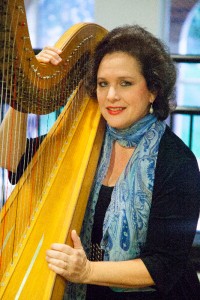 Lecturer Laura Byrne
Lecturer Laura Byrne
- What is your position on faculty and what courses are you teaching next semester (and this summer, if applicable)? I am the Harp Instructor at UNC and have been here for 15 years. I am teaching Harp 203 next year. I am especially looking forward to having my harp students perform in the harp ensemble next fall!
- What is your favorite part of teaching? My favorite part of teaching is helping the student bring the music on the page to life, through their mind, their heart, and their hands. I am most excited about coming back to teaching in-person and helping my students prepare their final performances for the semester.
- What are some of your non-musical hobbies? My non-musical hobbies are cooking, gardening, and my 2 labrador retrievers Skylar and Ardenne.
- If your students could learn one thing from you, what do you hope it will be? Practice a lot then play from their hearts!
- What music are you currently listening to? I am listening to JAZZ.
- Anything else you’d like students to know about you or your teaching? I want to empower my students to play well with good technique, but more importantly, with musical intelligence and soul.
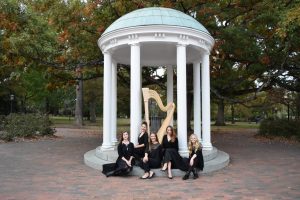
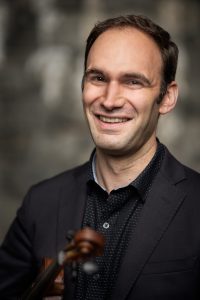
Associate Professor Nicholas DiEugenio
- What is your position on faculty and what courses are you teaching next semester (and this summer, if applicable)? Associate Professor of Music, with a specialty in violin and chamber music. Next semester: MUSC 103, 203, 303, (private lessons), and 214 (chamber music).
- What is your favorite part of teaching? In one word, “discovery.” I love helping students to discover their musical voice, to discover new music and repertories, and for me to discover new aspects of teaching, of performing, and of music from my students as well.
- What is the project that you’re most excited about currently? Together with Professor Solomon, I have been examining new ways of performing works for violin and piano from the early and mid-19th century. We have been using UNC’s incredible collection of keyboard instruments including a Graf piano made by Rodney Regier, as well as an original Pleyel piano from 1842. I have been using various bows and alternate string material, such as a classical German style bow by Ralph Ashmead and a late 19th-century French bow from the workshop of J.J. Martin. Using insight from treatises and the sonic properties of these actual instruments, we have been re-shaping our approach to the music of Schubert in particular. Our aim is not so much to “recreate” or to be “authentic,” but rather to unlock new expressive possibilities with this music.
- WATCH: “Scherzo: Presto“ from Grand Duo in A Major, D 574 for violin and piano (1817) by Franz Schubert
- In the above video Professors DiEugenio and Solomon perform on the Graf piano and a violin with alternate string material.
- WATCH: “Scherzo: Presto“ from Grand Duo in A Major, D 574 for violin and piano (1817) by Franz Schubert
-

Members of the UNC Violin Studio (Photo courtesy of Nicholas DiEugenio) What are some of your non-musical hobbies? I love following women’s tennis (big Naomi Osaka fan), painting, and going for walks.
- If your students could learn one thing from you, what do you hope it will be? Making music is about relationships and problem-solving.
- What music are you currently listening to? I’ve done a deep dive with Schubert this past month! All of Schubert’s symphonies, many of his songs, his string quartets, piano trios, octet, and all of his music for violin and piano! I’ve also been listening to violinist Rachel Barton Pine’s “Blues Dialogues” album, especially the solo violin piece “Filter” by Daniel Bernard Roumain.
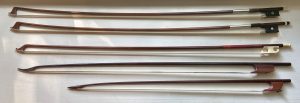
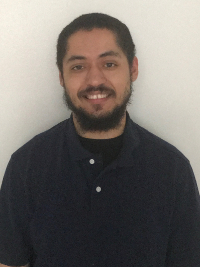
Assistant Professor Aaron Harcus
- What is your position on faculty and what courses are you teaching next semester (and this summer, if applicable)? Assistant Professor of Music with specializations in music theory and the history of Black music in the United States. The courses I will be teaching next semester include a graduate seminar on Current Trends in the Historiography of Black Music in the United States (MUSC 890) and an upper-level music course tentatively titled “Genres, the Music Industry, and the Conditions of Creativity” (MUSC 355).
- What is your favorite part of teaching? I always enjoy any opportunity I get to engage in critical dialogue with our exceptionally bright and diverse undergraduate and graduate students at UNC about any number of subjects ranging from beat making, general musical aesthetics, music and race, and the history of Black popular music.
- What is the project that you’re most excited about currently? I am currently interested in reexamining the question of how what the media studies scholar Jason Toynbee describes as the “inevitability of musical genres” both enables and constrains the production, consumption, and interpretation of popular music. In focusing on genres, my current research is also interested in scrutinizing certain historiographical framings of Black music in the United States that have tended to reduce questions about the co-articulation of music, race, class, and gender to questions of essentialism and authenticity. For example, the music industry’s role in reproducing essentialized relations between types or kinds of music and types of consumers and producers.
- What are some of your non-musical hobbies? Outside of music, philosophy, and history, I am a huge NBA fan (sadly rooting for the Timberwolves…) and I especially enjoy a good game of dominoes with friends and family.
- If your students could learn one thing from you, what do you hope it will be? Beyond developing the basic tools and skills to enhance one’s critical thinking skills, I hope my students develop a greater aesthetic appreciation for a diverse range of musical practices beyond those styles our students are most familiar with prior to taking my courses.
- What music are you currently listening to? I’ve mostly been listening to Race records from the 1920s such as Mamie Smith, Ethel Waters, the Hot Five and Seven Records, and Arizona Dranes. This is both for pleasure and as a part of my research on genre and the history of Black popular music in the United States.
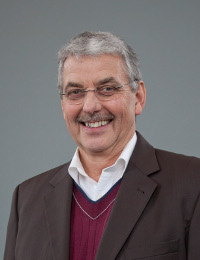
Professor Donald Oehler
- What is your position on faculty and what courses are you teaching next semester (and this summer, if applicable)? Donald L. Oehler, Professor of Music. Clarinetist, chamber musician, and conductor. Although I have taught many different classes over a long tenure on campus, I regularly instruct the clarinet studio and coach the University Chamber Players. I am the resident director for the UNC Burch Honors Abroad Seminar in Music; London and Florence. This is a semester-long study abroad program in music held in London (for two months) followed by a two-month residency in Florence, Italy. The program is open to all qualified majors, minors, non-majors with a full academic load of UNC classes (Honors) including musical theatre (London) and Italian Opera (Florence), individual lessons with local instructors and chamber music performance all for credit. I also teach two classes in the program: What is a Work of Art? and the History of Chamber Music. The program also includes weekly concerts, shows, operas, travel, and a student performance with Italian students ending the semester in late April within the shadow of the famous Cathedral of Santa Maria del Fiore (the Duomo). Join us for the spring of 2022! I take a break from the classical arena teaching the Intro to Jazz (M145) class during the upcoming second summer term.
- What is your favorite part of teaching? Any student who walks through the door! If they are interested, want to learn, and are ready to work, so am I.
- What is the project that you’re most excited about currently? I certainly enjoy planning for the semester abroad program, no question about that. Each student has individual goals and aspirations, especially when it comes to international experiences. Working with the students, individually and collectively, to plan for a successful term abroad is a great project – which can never begin too soon. I also do research on a catalog of music for string quartet with clarinet. The project keeps me busy year ‘round, meeting folks from across the globe in and out of music. https://clarinetquintet.web.unc.edu/ Yes, the project can be esoteric, but it’s so interesting to learn of the repertoire and it presents many mysteries to be solved.
-
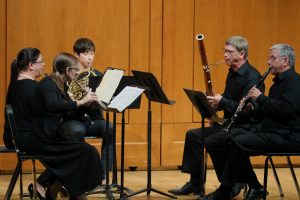
Donald Oehler and the Carolina Wind Quintet perform on Moeser Auditorium stage in 2018. What are some of your non-musical hobbies? I was a life-long runner until recently. Now I have turned my interest to walking – serious walking. We have a house full of antique clocks (always in need of attention), collect oriental carpets and I like non-music historical reading. Somehow food and baking get involved in all this, too. Our two daughters, sons-in-law, and grandkids all offer endless text messaging and banter about daily life; enough to keep anyone busy 24/7.
- If your students could learn one thing from you, what do you hope it will be? One thing? Difficult to say, but; nothing is more optimistic than music – it’s always moving forward. And we should do the same, never stop moving forward (con moto). Trust your musical senses, be confident in your abilities, and always respect those around you. One never walks on stage alone – even a pianist in a solo recital has the composer as a partner.
- What music are you currently listening to? What can be better than a great artist’s soul emerging unimpeded, wrapped in the glorious sounds of the human voice? So, I listen to vocalists: Angela Gheorghiu, Rolando Villazon, K. D. Lang, Danielle De Niese, Linda Ronstadt, Ella, Jonas Kaufmann and yes, Dolly Parton. I mean, these folks can ‘push a phrase.’ I conduct an orchestra (Chapel Hill Philharmonia) – when there is no pandemic – so I get plenty of opportunities to work with orchestral repertoire. My personal instrumental performances are in chamber music with keyboard, strings, and voice as well as in the Carolina Wind Quintet. I try not to listen to music on which I am working just to be sure I can lift the music off the page without any bias.
